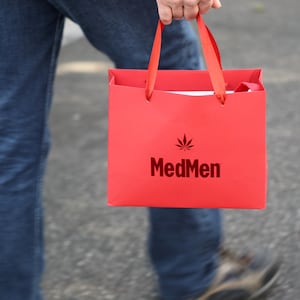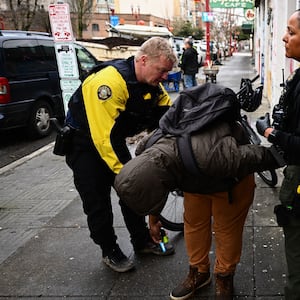Pay Dirt is a weekly foray into the pigpen of political funding. Subscribe here to get it in your inbox every Thursday.
It’s not often that a member of Congress faces backlash for a drug deal gone bad.
In this case, the alleged deal doesn’t involve illicit substances changing hands. Rather, it concerns an alleged exchange of money and sway between now-Rep. Val Hoyle (D-OR) and the cofounders of a cannabis company called La Mota, one of the largest dispensary chains in Oregon.
Those co-founders, Rosa Cazares and Aaron Mitchell, have been mired in the scandal for a year now, after local outlet Willamette Week unearthed evidence that La Mota had an improper private financial arrangement with Oregon Secretary of State Shemia Fagan, prompting the spectacular implosion of a new grant program. Fagan resigned within weeks, but the investigation has only expanded since then, with a Justice Department subpoena in January signaling that the feds are starting to eye Hoyle.
A Hoyle campaign spokesperson told The Daily Beast on Wednesday that the DOJ has not contacted the congresswoman. But documents from a public records request filed with Hoyle’s former state office, obtained by The Daily Beast, offer a glimpse of what the DOJ may have collected from that subpoena.
The request was placed with Hoyle’s former agency—the Oregon Bureau of Labor and Industries (BOLI)—months before the DOJ subpoena, asking for documents related to the La Mota investigation. It was fulfilled on Feb. 14, two days after the subpoena was first reported. BOLI’s reply didn’t indicate that any responsive documents had been withheld due to the investigation. Those documents include details about La Mota’s state grant, meeting minutes, and a previously unreported email that shows Hoyle expressing personal interest in securing the since-revoked $554,990 grant.

Rep. Val Hoyle (D-OR) arrives to the U.S. Capitol.
Tom Williams/CQ-Roll Call, Inc via Getty Images“I’m still the chair of the Apprenticeship Council and will be until January,” Hoyle wrote in that email, which she sent to her deputy. “I’d like to feel like I have some involvement in setting the agenda or at least have the option to weigh in before we move forward.”
Hoyle was first elected BOLI commissioner in 2018, and she held that post until she joined Congress in January 2023. She first met Cazares in early 2021 at a skyline-view restaurant, Willamette Week reported, where the two discussed the possibility of a state-sponsored La Mota apprenticeship for people of color. Over the ensuing months, employees at the bureau stayed in touch about the possibility, and the La Mota project soon took the form of a minority outreach nonprofit, a consortium of players in the Oregon cannabis industry called “ENDVR.”
During the push for the apprenticeship grant, Cazares and Mitchell doled out major donations to some of the state’s most prominent Democrats. One of the couple’s biggest beneficiaries was Hoyle, who received a $20,000 cash donation months after meeting Cazares, in support of her anticipated BOLI re-election bid. (At the time, Oregon permitted unlimited cash contributions in state elections, but the La Mota scandal has led to a $100 cap on cash gifts, along with other reforms.)
But Hoyle had other plans. When the longtime Democratic incumbent in Oregon’s 4th District, then-Rep. Peter DeFazio, announced he would not seek re-election, Hoyle jumped in the race. Oregon campaign finance records show that her state campaign refunded Mitchell’s $20,000 in December 2021, with Federal Election Commission records showing that Mitchell and Cazares both contributed $2,800 for Hoyle’s congressional primary election about four months later, in multiple donations of varying denominations on April 30—days before ENDVR submitted its grant proposal. Cazares also threw another $200 in for Hoyle’s general election account that same day, an amount that, if split between the two donors, would have put them both at the exact primary election maximum of $2,900.
It’s unclear whether those original contributions came in the form of cash, the default payment method for many cannabis industry operators in the state. The various payments were not made through ActBlue’s online system, raising the possibility of multiple same-day checks or wire transfers.
While legal at the time in Oregon state elections, cash donations above $100 are impermissible for federal campaigns and committees.
Asked about the La Mota funds when the scandal broke last year, Hoyle released a statement saying, “I’ve returned all campaign contributions from La Mota owners and won’t be taking any additional funds from them.”
But she hadn’t returned the money. In fact, Hoyle’s campaign didn’t issue the refunds until last November. Additionally, Hoyle is also still holding on to money from a third La Mota associate made around the same time—a $1,000 gift from Laura Vega, who co-founded ENDVR with Cazares. Unlike Cazares and Mitchell’s contributions, Vega’s funds were earmarked through an ActBlue online donation portal.
In response to an inquiry for this article, Hoyle provided a statement claiming that all of The Daily Beast’s questions had already been addressed.
“All these questions have been asked and answered. Knowing what we know today, I would not have accepted political support or interacted with anyone associated with La Mota,” the statement said.
A Hoyle spokesperson claimed in an email to The Daily Beast that the La Mota donations were not made in cash. The campaign did not reply to follow-ups explaining the unusual same-day increments and requesting documentation to confirm that the funds were not cash.
Asked why the campaign still hadn’t returned Vega’s donation, the spokesperson dodged. “When there are credible allegations that a contributor of Congresswoman Hoyle’s campaign has engaged in wrongdoing, she takes a look at it and takes the appropriate action.”
At the time of the 2022 donations, La Mota and Hoyle were still pushing ahead with the apprenticeship proposal. But at a July proposal meeting, friction emerged between the apprenticeship council and ENDVR—which received its 501(c)(3) tax status shortly before applying for the grant—with some board members expressing doubts about whether the upstart nonprofit merited a grant of half a million dollars in public funds.
Throughout that meeting, however, Hoyle was texting on her personal phone with the director of the apprenticeship program, Willamette Weekly reported. In response to one text from the director—appearing to advise Hoyle about “demonstrated value,” as if Hoyle were the one making the pitch—Hoyle replied, “You don’t need to convince me.”
“It’s the board,” she texted.
Hoyle, however, kept advocating, as captured in an email exchange with deputy labor commissioner Duke Shepherd the next month.
In that email, part of the records obtained by The Daily Beast, Hoyle vented about a follow-up email that La Mota had recently sent in response to skeptical council members. She critiqued La Mota’s pitch, but also expressed her personal support for the project and bemoaned the fact that she hadn’t been brought in before La Mota had sent the response.
“This still seems pretty squishy,” Hoyle wrote, saying she was “concerned about the ‘not get it’ factor” and adding that “we need solid committments [sic] for numbers.”
Hoyle then wrote that, while she was “very supportive of the program,” she needed to see “more solid” commitments, before making clear that she expected to be looped in ahead of any similar moves involving La Mota.
“I also am really surprised that this email went out and council briefings are happening without me being briefed or contacted first,” she wrote. Hoyle advised her deputy that “our staff should be more instructive” to help the group meet the council’s requirements, then made the request to have “some involvement in setting the agenda.”

Rep. Val Hoyle (D-OR) poses for photos with a cutout of the University of Oregon Duck mascot outside the Capitol.
Bill Clark/CQ-Roll Call, Inc via Getty ImagesHoyle scheduled the follow-up meeting that same month, where Vega—the Hoyle donor and ENDVR co-founder—brought in some new endorsements. One of the new vouchers was Oregon Liquor and Cannabis Commission board member Matt Maletis, who told the council that he’d gotten to know Cazares and Vega, noting, “The fact that they’re willing to give back and train others how to do this is admirable.”
On Aug. 26, La Mota won the grant, worth nearly $555,000. About two weeks later, Maletis donated $250 to Hoyle’s congressional campaign. She won the election in November.
Maletis then gave Hoyle $250 in January 2023, and another $250 again last September. (Another ENDVR affiliate, Jesse Bontecou of the Oregon Retailers of Cannabis Association, gave Hoyle $100 in October 2022.)
But it didn’t take long for the whole thing to unravel. A March 2023 Willamette Week investigation revealed that La Mota and its founders were secretly facing millions of dollars in tax liens along with dozens of lawsuits for unpaid bills. The grant itself, intended to fund a handful of apprenticeship opportunities for communities of color, also eventually proved legally nonviable. Oregon’s new labor commissioner immediately recalled the grant money—but not before ENDVR had already paid Vega $97,000.
The scandal soon claimed another scalp, in the form of Fagan’s resignation. The Secretary of State—whom Cazares and Mitchell had also raised money to support—had been consulting for La Mota to the tune of $10,000 a month while her office was reviewing state cannabis regulations. The DOJ also got involved, subpoenaing five state agencies to probe the matter.
(The Daily Beast asked the Hoyle campaign when the congresswoman “first heard” about Fagan’s side deal; the spokesperson replied that Hoyle had “first learned” about the arrangement from news reports.)
The scrutiny on Hoyle only increased. Last summer, Willamette Weekly broke another development—Hoyle still hadn’t given BOLI communications from her personal devices, which BOLI had inquired about in emails ahead of her departure as part of its standard record-keeping obligations for the state.
That dispute dragged on for months, with Hoyle eventually partially conceding in November, only turning over select records that had been filtered by her attorney.
The Hoyle campaign told The Daily Beast that the omission was not intentional, claiming that BOLI had deactivated Hoyle’s email account on the same day it sent the first notice, and the second notice had gone lost amid the chaos of the House Speaker election and the death of a family member.
“Once Hoyle learned of the request in late August, she worked to transfer the records to BOLI,” the spokesperson said. The spokesperson noted that Hoyle “wishes BOLI was more communicative and more responsive” to requests to review the text messages, adding “it is most important that this information is now available to be archived as part of the public record.”
BOLI, however, cannot say exactly how complete that “most important” public record is. Asked about the production, a BOLI spokesperson told Oregon Live in November that they “would have no way of knowing if all public records were provided to the agency.”
A BOLI spokesperson told The Daily Beast that the agency is not commenting on matters related to the investigation. La Mota did not return a comment request.
In December, still more bad news—Oregon Public Broadcasting reported that BOLI had settled a second lawsuit alleging racial discrimination on Hoyle’s watch.
Then, on Jan. 29 this year, the DOJ signaled that the investigation was examining Hoyle’s role, issuing its subpoena to BOLI for records related to the ENDVR grant.
Despite the district’s Democratic bent, Republicans see Hoyle’s seat as one of their top pick-up opportunities for 2024. Her top GOP opponent, Air Force veteran and attorney Monique DeSpain, has made much political hay of the scandal as it has unfolded, and will square off against a small field in the Republican primary next month.
The House GOP’s official campaign arm targeted the race as part of a five-figure ad blitz last month. That buy also took aim at Hoyle’s fellow Beaver State Democrat, Rep. Andrea Salinas.
In February, news broke that the Salinas campaign had also received a donation from La Mota.









